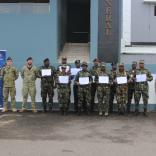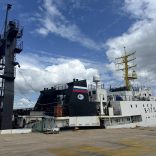Mozambique: Police recover 12 goats stolen from UEM
Hidden debts: Prosecution demands compensation of three billion dollars – AIM report

Photo:Lucas Meneses / Lusa
The prosecutor in the case of Mozambique’s largest ever financial scandal, known as the case of the hidden debts, on Monday demanded that the 19 accused should be ordered to pay compensation to the state of 2.902 billion US dollars, plus interest.
Prosecuting attorney Sheila Marrengula did not say from what date the interest should be calculated, but the first of the illegitimate loans contracted by the three fraudulent, security-related companies, Proindicus, Ematum (Mozambique Tuna Company) and MAM (Mozambique Asset Management) was contracted in 2013.
The loans, with their illegal state guarantees, had plunged the country into a serious financial crisis, Marrengula stressed.
Initially, only the Ematum loan was publicly known, because it took the form of a bond issue on the European market. The Proindicus and MAM loans were clandestine. It was only in April 2016 that an article in the “Wall Street Journal” broke the secrecy and the true scale of the scandal became known.
The immediate result was that the International Monetary Fund (IMF) suspended its programme with Mozambique, accusing the government of concealing the truth about the true size of the country’s foreign debt. All 14 donors and funding agencies that provided at least some of their aid to Mozambique in the shape of direct budget support, suspended all further disbursements. Today, more than five years later, direct budget support has not resumed.
This was a major blow to the public finances – hundreds of millions of dollars a year in budget support were lost at a stroke, and this proved more damaging than the repayment of the loans, which has so far been limited.
A report on the costs of the “hidden debts” published in May by the anti-corruption NGO, the Centre for Public Integrity (CIP), showed that, so far, the direct cost of the loans, up to and including 2019, is 674.2 million dollars, in payment of interest and capital. But if Mozambique is obliged to go on servicing the debts, there will be an additional 3.93 billion dollars to pay up to 2031.
But the indirect costs of the scandal are much higher. The loss of foreign aid in 2016 alone cost Mozambique 831 million dollars, and these losses have continued to cascade down the years.
The CIP report calculated the fall in the value of Mozambique’s GDP at 10.7 billion dollars between 2015 and 2019. This is a loss that cannot be recovered, and it will continue to grow, year after year. The report puts the total economic losses over this four year period at 11.33 billion dollars.
At the centre of the prosecution indictment, is the Middle Eastern group, Privinvest, headquartered in Abu Dhabi and Lebanon. Marrengula gave damning details of the bribes paid by Privinvest to the defendants. She cited bank accounts in Abu Dhabi, Lebanon and Mozambique, and the amount of money deposited in each of them. She could also give the serial number of each of the cheques involved.
Key to these negotiations was Privinvest official Jean Boustani. During a visit by some of the defendants to Abu Dhabi in 2012, said Marrengula, Boustani agreed to pay bribes of 33 million dollars to Ndambi Guebuza, the oldest son of the then President Armando Guebuza, and 8.5 million dollars each to two of his associates, Teofilo Nhangumele and Bruno Langa.
But Boustani made it clear that the money would not be paid until Credit Suisse had sent the money for the first loan, for Proindicus, to Privinvest. One of the peculiarities of these loans is that the money was not sent to the companies that were supposed to benefit. Instead the money went straight to Privinvest which became the sole contractor for the three companies.
Not only has the prosecution obtained the bank details of the defendants, but also copies of the emails they exchanged. These revealed how the defendants had clashed over how much money they should each receive.
The huge bribe sent to Ndambi Guebuza was supposed to pay several other people, but he was reluctant to transfer it. When he refused to pay SISE official Cipriano Mutota, the latter became extremely angry. “He was fuming and he thought I’d taken it all”, Nhangumele emailed Boustani. But it was Guebuza Junior who “is refusing to pay money to anyone. He is creating unnecessary noise”. This was eventually smoothed over with a payment of 980,000 dollars to Mutota.
To comply with banking regulations in the United Arab Emirates, Ndambi Guebuza and Bruno Langa pretended to meet UAE residency requirements. They claimed to be engineers doing various work for Privinvest companies.
“None of them had any engineering qualifications. But they opened accounts in Abu Dhabi banks”, said Marrengula.
Several defence lawyers sprang to the defence of their clients – but they had no detailed information that could refute the prosecution indictment. Instead they claimed that the activities of the defendants did not meet the definition of the crimes of which they are accused (such as membership of a criminal association, embezzlement and money laundering).
Abdul Gani, lawyer for the former general director of SISE, Gregorio Leao, claimed that Leao had nothing to do with managing the funds of Proindicus, Ematum and MAM, while Alexandre Chivale, representing Guebuza Junior said the money in question belonged to Privinvest and not to the Mozambican state, and so there could have been no embezzlement.













Leave a Reply
Be the First to Comment!
You must be logged in to post a comment.
You must be logged in to post a comment.